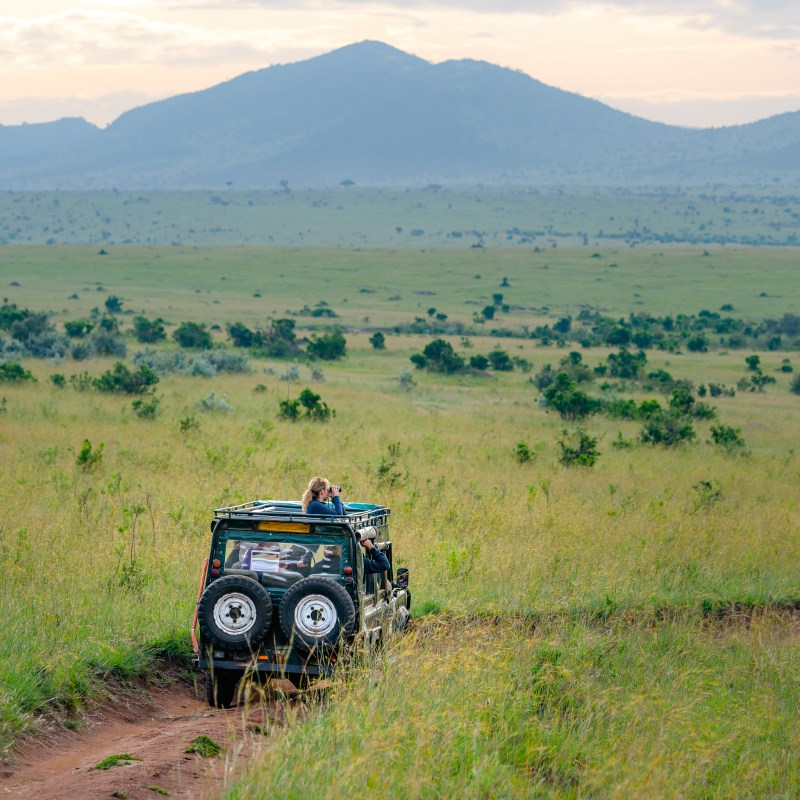
Planning a safari conjures up images of stunning landscapes, spectacular animals, and luxurious lodgings set amidst pristine landscapes. Alas, it also conjures up some very expensive price tags. This was the exact dilemma I faced while planning my trip to Botswana. Faced with a seemingly impossible dilemma, I dived into research and discovered camping safaris.
Truthfully, I’m a lukewarm camper at best. Sure, I put on a brave front each year when I join family and friends on our annual outdoor adventures. But I always feel out of my element (and I miss my bathtub). Still, there was no denying that a Botswana camping safari in Chobe National Park was downright affordable compared to the luxury lodges. As such, with a few reservations but with a lot of motivation, I committed to what would be one of the most memorable (and occasionally challenging) trips of my life.
If I had the chance to do it all over again, I would. But I wish someone would have told me these things before I went.
1. You Don’t Need Camping Gear. At Least, Not Much
Most camping safari outfitters include tents, camping chairs, all food and cooking supplies, and even mattress pads. You have the option of renting a sleeping bag, but I took my own — and I’m glad I did. I was just more comfortable having something that was never used by anyone else. I bought a very small, very lightweight sleeping bag for about $30 back home. It only took up a small corner of my bag. At the end of my trip, I asked my guides if I could give it to them and have them donate it to someone in need, and they were thrilled to do so.

2. Relax. You Will See Animals
Luxury lodges have their own airstrips but camping safaris have a whole lot of dusty driving and not much in the way of wildlife before you reach your initial destination. Whatever you do, don’t think of this as wasted time. Take the time to get to know your guides and pepper them with questions about the plants, flowers, trees, and birds. Their knowledge is extraordinary, and they’ll likely have field guides you can borrow to read up on all that you’re seeing.
Before you know it, you’ll be seeing animals. Lots of animals.
3. Don’t Get Too Hung Up On The Big Five
The lion, leopard, elephant, Cape buffalo, and rhinoceros make up the “Big Five” — the ultimate safari bucket list. And while it’s fun to have a list, some folks take it a bit too far. I’ve seen guests who considered their adventure a failure because they didn’t see all Big Five on the trip. Your chances of seeing the Big Five (or not) on a camping safari are the same as any other kind of trip.
Speaking of the Big Five … in all my years of travel, I’ve never seen a leopard. But at least one leopard has seen me, and it’s all thanks to camping. Urgent bathroom needs convinced me to sneak out of my tent one night — just for a minute! — to quickly pee. The next morning, our guide pointed out the fresh, feathery remains of guinea fowl and reported that a leopard had spent the night just steps from our tent, enjoying his snack. After that report, I learned to hold it!
4. Camping Means Close-Ups
While not every safari participant has the opportunity to moon a leopard, there’s no denying that this way of travel allows you to get up close and personal with the wildlife. On one memorable occasion, we awoke to see a firm path of deep, intimidating lion footprints — the pathmaker had meandered directly through our site just hours earlier. On another occasion, a hyena lay on its belly and watched us, from a safe distance, as we finished our evening meal. Birds loved visiting us as we set up camp. And because we stayed in the heart of Chobe National Park, the minute we got in the jeep, we saw big animals.

5. Early To Bed, Early To Rise
The best safari experiences start early in the morning as the animals are enjoying the cool dawn temperatures. A camping safari is no exception. You’ll be awake before there’s light in the sky. However, unlike safaris that are based at a lodge, you won’t be coming back home for a quick nap after your first game drive of the day. Every day means packing up camp just as light is beginning to break. Typically, you go to bed in the early evening after the dishes are done.
If you’re not used to a 5 a.m. wake-up call or an 8 p.m. bedtime, a camping safari is a big adjustment. If I had to do it all over again, I would have gradually adjusted my sleep schedule a few days before my departure so my body would be used to the schedule.
6. Camping Food Is Impressive
If you think camping cuisine means beans and wieners, you’re going to be mightily impressed on a camping safari. We enjoyed fresh bread every morning, baked in the embers of last night’s fire. Dinners included chicken curry, stir fry with noodles, and a South African-style braai feast of sausages, steak, and more. We enjoyed desserts and sophisticated salads like beet and feta and, overall, I was thrilled with the food and the portions.
7. The Coffee Is Not
My only food-related complaints applied to coffee and tea. The instant coffee available at breakfast and break time left much to be desired. I suddenly realized just what a coffee snob I am! I had some coffeeshop brand instant coffee and latte mix with me, and it offered a welcomed change. Tea drinkers will want to note that just one kind of black tea is usually available. If you love tea, a box of assorted flavors would be a welcome treat for the entire group.

8. Your Camping Chores Are Actually Pretty Easy
Some camping safaris offer deluxe tents (which are set up for you as you’re enjoying an evening game ride), spacious outdoor showers, and some extra comforts. But the most hands-on and affordable experience is a participatory camping safari. “Participatory” is just a fancy way of saying you’ll be helping out with the chores. Turns out, they’re pretty easy. You’ll assist as the guides set up your tents, you’ll help unload folding chairs and tables from the truck, and you’ll lend a helping hand when the canvas frames of the shower and toilet are being installed. You truly need no camping skills, just a willingness to help out.
9. Think Twice About Your Safari Wardrobe
You’ll dress much differently for a camping safari than you would a lodge trip. Cool, casual clothing is paramount for your comfort. I’m glad I brought thin, loose, comfortable trousers made from quick-dry material. I even slept in them some nights! I was especially thrilled with my choice when it came to the awkward climb in and out of the safari vehicle. I was equally happy that I brought along a classic Tilley hat, a lightweight long-sleeved shirt (for layering against the early morning chill), and a somewhat stereotypical “safari” shirt. While I never put the endless pockets to use, it was incredibly lightweight and dried in an instant.
Far less comfortable were the athletic-style tops that promised to wick away moisture and keep me cooler than a regular cotton shirt. They just clung to my body and didn’t allow for any fresh-air circulation. All. Day. Long. If I could do it all over again, I’d swap them out for extra safari shirts and regular everyday t-shirts.
10. Yes, There’s Laundry
Most camping safari programs include one night at a commercial campground about two-thirds of the way into your trip. Their amenities typically include a bar, decent showers, and the chance to get your laundry done. Best money I’ve ever spent!
11. Camping Showers Are Awesome (And A Bit Awkward)
I’m not sure a shower has ever felt so refreshing as the one I enjoyed after two days of safari adventures. Thanks to my clingy wardrobe of athletic fabrics, I was overheated, horribly sweaty, and dust clung to me like that was its job. Our camp shower consisted of a simple four-sided canvas shelter with a flap of fabric for a door. A perforated rubber mat was comfortable underfoot and ensured you didn’t stand in the mud. A folding chair just outside the fabric flap was convenient for storing towels and supplies, while a cone-shaped bucket with a showerhead nozzle hung from the tree overhead and provided a surprisingly strong stream of water. A quick scrub never felt so good! But wriggling in and out of my vexing wardrobe was an exercise in frustration! Yet another reason to bring a few things that are loose and breezy.
Pro Tips: When To Visit And Additional Safari Advice
Chobe National Park is gorgeous all year round but would-be visitors should note that the dry season typically runs from April to October and the rainy season goes from November through March. Game viewing is considered best between late May and November, but in April and early May, the lush grass is thick and long after months of ample water. As such, animals have superb camouflage and game viewing is more challenging.
For more safari inspiration, consider:
